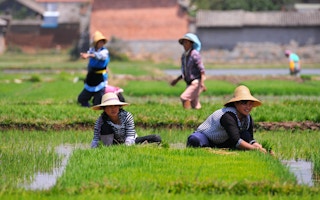Give women the same access to land, credit, advice and markets as men, and they could increase yields on their farms by more than 20 per cent, boosting total global agricultural output by up to four per cent, a leading land rights researcher said.
Women produce nearly half of the food grown in the developing world, yet women farmers receive only five per cent of all agricultural extension services globally - including credit, training, marketing and research, according to the UN Food and Agricultural Organisation (FAO).
If women farmers were given more resources, they could help reduce the number of hungry people in the world by up to 150 million people, according to the UN World Food Programme.
For years, campaigners have argued for more investment in women farmers, and better recognition of their land rights.
“
We have a real challenge that could push back women’s rights to land - the commercialisation of agricultural land
Mark Goldring, chief executive of advocacy group Oxfam
Elisa Scalise, director of the Landesa Center for Women’s Land Rights said in many countries and regions, the situation for women farmers had improved.
“The global trend is positive,” Scalise said in an interview on the sidelines of a women’s conference organised by the Thomson Reuters Foundation.
“Regional bodies and national governments are at least talking about women’s land rights now, and just 5-10 years ago this was not the case,” she said before a debate on access to land.
For example, Kenya used its 2010 constitution to provide protections for female property rights.
In China, where women are estimated to account for more than 70 per cent of the agricultural workforce, the need to protect women’s land rights was, for first time in its modern history, included in a major policy document released earlier this year, Scalise said.
Citing research that showed land did better under the management of women farmers, she said in Vietnam capital investment in rural areas was higher when women hold land title, and in Rwanda, female-headed households were more likely to invest in soil conservation measures.
David Norman, senior manager for sustainable development for SABMiller, a multinational beer company, agreed that improving women’s land rights can boost economic growth.
“There is a return on investment” when female farmers are empowered, Norman told the Trust Women conference.
Landesa says women who own land have 3.8 times more income than those who don’t, their children are 33 per cent less likely to be severely underweight, and they are eight times less likely to face domestic violence.
Yet women are still battling to secure their land rights.
“We have a real challenge that could push back women’s rights to land - the commercialization of agricultural land,” Mark Goldring, chief executive of advocacy group OXFAM, told the Trust Women conference.
Land equivalent to eight times the size of the UK has been sold to major companies in the last decade… as agriculture becomes more commercial… the traditional status of women gets worse,” Goldring said.
Of 143 countries surveyed by the World Bank earlier this year, 37 still have discriminatory land laws in place.
Changing this needs to “start with understanding that land rights are part of a cultural system, and that cultural systems also define gender roles,” Scalise said. “That link is critical.”
Having a strong champion in government helps, she said, along with providing special effort to ensure women can attend public forms and decision-making events.
“There must be political will for putting technical and budgetary resources behind ensuring that the needs of both women and men are integrated into land rights reform programmes,” Scalise said.










